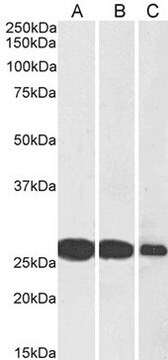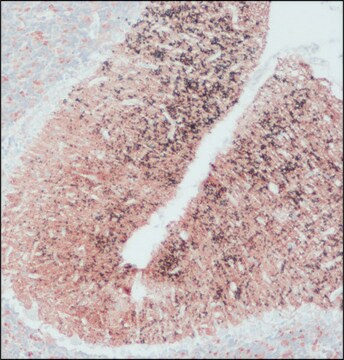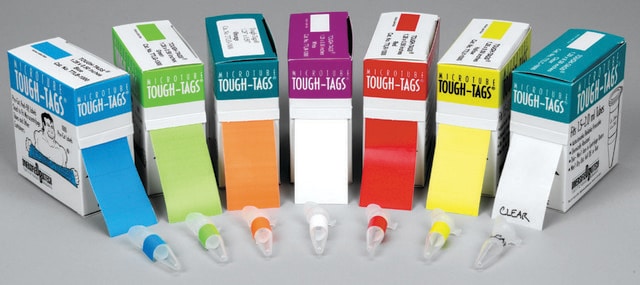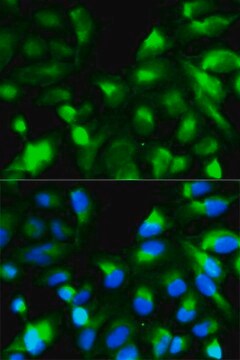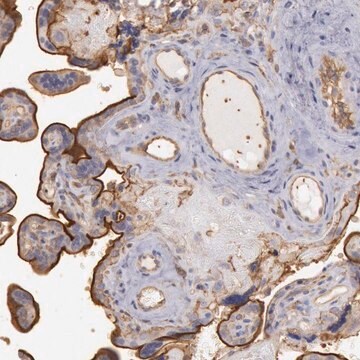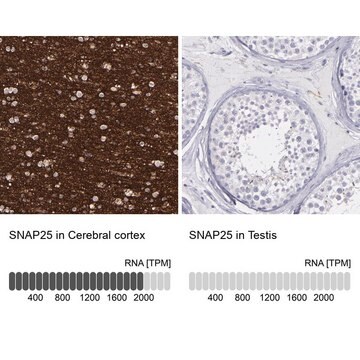ZRB1326
Anti-SNAP-25 Antibody, clone 1J9 ZooMAb® Rabbit Monoclonal

recombinant, expressed in HEK 293 cells
About This Item
Recommended Products
biological source
rabbit
Quality Level
recombinant
expressed in HEK 293 cells
conjugate
unconjugated
antibody form
purified antibody
antibody product type
primary antibodies
clone
1J9, recombinant monoclonal
description
recombinant, expressed in HEK 293 cells
product line
ZooMAb® learn more
form
lyophilized
mol wt
calculated mol wt 23.32 kDa
observed mol wt ~28 kDa
species reactivity
human, mouse, rat
species reactivity (predicted by homology)
monkey, canine, bovine
packaging
antibody small pack of 25 μL
greener alternative product characteristics
Waste Prevention
Designing Safer Chemicals
Design for Energy Efficiency
Learn more about the Principles of Green Chemistry.
enhanced validation
recombinant expression
Learn more about Antibody Enhanced Validation
sustainability
Greener Alternative Product
technique(s)
affinity binding assay: suitable
immunocytochemistry: suitable
immunohistochemistry (formalin-fixed, paraffin-embedded sections): suitable
western blot: suitable
isotype
IgG
epitope sequence
Internal
Protein ID accession no.
UniProt accession no.
greener alternative category
shipped in
ambient
storage temp.
2-8°C
target post-translational modification
unmodified
General description
Each ZooMAb® antibody is manufactured using our proprietary recombinant expression system, purified to homogeneity, and precisely dispensed to produce robust and highly reproducible lot-to-lot consistency. Only top-performing clones are released for use by researchers. Each antibody is validated for high specificity and affinity across multiple applications, including its most commonly used application. ZooMAb® antibodies are reliably available and ready to ship when you need them.
Learn more about ZooMAb here.
Specificity
Immunogen
Application
Evaluated by Western Blotting in Mouse brain tissue lysate.
Western Blotting Analysis: A 1:1,000 dilution of this antibody detected SNAP-25 in Mouse brain tissue lysate.
Tested applications
Western Blotting Analysis: A 1:1,000 dilution from a representative lot detected SNAP-25 in Human and Rat brain tissue lysates.
Immunocytochemistry Analysis: A 1:10-100 dilution from a representative lot detected SNAP-25 in E18 Rat cortical cells and SH-SY5Y cells.
Affinity Binding Assay: A representative lot of this antibody bound SNAP-25 peptide with a KD of 1.0 x 10-12 in an affinity binding assay.
Immunohistochemistry (Paraffin) Analysis: A 1:100 dilution from a representative lot detected SNAP-25 in human cerebral cortex tissue sections.
Note: Actual optimal working dilutions must be determined by end user as specimens, and experimental conditions may vary with the end user
Target description
Physical form
Reconstitution
Storage and Stability
Legal Information
Disclaimer
Not finding the right product?
Try our Product Selector Tool.
Storage Class Code
11 - Combustible Solids
WGK
WGK 1
Certificates of Analysis (COA)
Search for Certificates of Analysis (COA) by entering the products Lot/Batch Number. Lot and Batch Numbers can be found on a product’s label following the words ‘Lot’ or ‘Batch’.
Already Own This Product?
Find documentation for the products that you have recently purchased in the Document Library.
Our team of scientists has experience in all areas of research including Life Science, Material Science, Chemical Synthesis, Chromatography, Analytical and many others.
Contact Technical Service